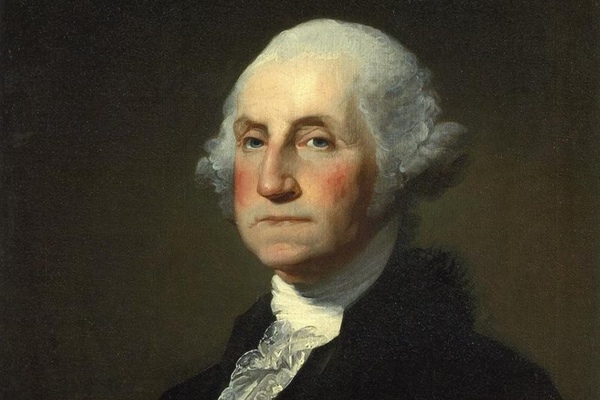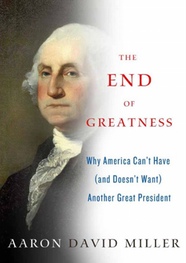Why We No Longer Get Great Presidents – And Why We Don't Need Them

Can America have another undeniably great President? And even if we could, would we want one?
Given our fascination with greatness in the presidency and the centrality of the institution in our politics and national life, these are two critically important questions. Not to disappoint, but my answers are provocatively counterintuitive: no and no.
Our search for greatness in the presidency – really an addiction without a fix -- has actually raised our expectations of presidential performance to dangerous levels; placed unreasonable ones on our presidents and skewed the debate over what constitutes an effective presidency. Indeed, these days the quest for great presidents has become more of a curse than a blessing, a liability rather than an advantage .In short greatness in the presidency is too rare to be relevant and too dangerous to be desirable. We need to get over it. And here’s why.
 Why America Can’t Have Another
Great President
Why America Can’t Have Another
Great President
Greatness by definition in any area of the human enterprise is rare. Three undeniably great presidents span the American story – one a century. Washington who more than any other single individual of his generation created the country; Lincoln who preserved it through civil war and reconstituted it a firmer moral and political ground; and Franklin Roosevelt who guided it through economic calamity and world war. A handful of other Presidents – Jefferson, Jackson, Teddy Roosevelt, Woodrow Wilson, Harry Truman – had their great moments too. But their accomplishments were not as great and their crises not nearly as severe while their flaws loomed larger.
The big three undeniably weren’t saints, but flawed and imperfect men, to be sure. But each combined the three elements from which their greatness derived: a crisis so hot and relentless that it served to tame unruly domestic politics; and the capacity and character to sense how and when to lead and to produce a consensus for dramatic change. Indeed, their greatness lay in their ability to lead the nation through its three greatest challenges and to extract from crisis the kind of changes that transformed the country forever for the better. And all in time would manage to transcend partisan division and came to be recognized not just as heroic figures by their own parties but gained recognition as national heroes too.
Since FDR the alignment of crisis, character and capacity has not appeared again. And twelve presidents down and counting, we have now gone the longest stretch in our history without an undeniably great president. That’s not to say the history of the modern presidency has been a story of mediocrity. Talented even brilliant presidents have accomplished much, strengthened the office and the country too. The supply of truly great presidents have always exceeded the demand. But four factors have conspired to produce very long odds that America can produce another great even if reconfigured in a more modern guise.
First FDR set a high bar for his successors almost impossible to top. How do you outperform a president elected to four terms who shepherded the nation through the Great Depression and led it to victory in World War II. The answer is you don’t. And that’s why every US president has lived, as historian William Leuchtenberg has written, in FDR’s shadow.
Second, fortunately for us we haven’t had the kind of a crisis that opens the door to greatness. Sure we’ve had traumas and crises – the Cuban missile crisis; JFK’s assassination; riots in the inner cities; 9/11. But none were sustained enough or, inclusive enough to encumber the country in the kind of purposeful enterprise that would allow the right leader to leave the stamp of greatness on the presidency. Interestingly enough, capitalizing on the explosiveness and urgency of the time, particularly a burgeoning civil rights movement, LBJ used his formidable legislative skills to emerge as the most transformative legislative president since FDR. Sadly his policies on Vietnam would severely tarnish his presidential performance and credibility.
The third factor that would make greatness more elusive is an increasingly dysfunctional political system which has become increasingly polarized, personal and partisan. This divisiveness further narrows the president's political space and creates fewer opportunities for coalition building and productive, presidentially inspired legislating, let alone historic breakthroughs. In the Bush and Obama years, partisan polarization has surged. And even if such legislation passed (in the case of the Affordable Health Care Act with only narrow partisan majorities), there are risks that it could not be sold as legitimate and broad-based. Eisenhower had no intention and could not even if he wanted to, roll back FDR’s new Deal. Can the same be said of Obamacare should a Republican win the presidency in 2016? And to make matters worse the role of government itself as an agent of remedy and reform is increasingly questioned making the president’s task even harder.
Fourth, the 24/7 media cycle did not create the diminishing of the modern President. But it makes a president’s job even harder. It strips away the detachment and mystique of what is required to maintain the authority of the great leader. Sure it offers presidents a wider stage. But it trivializes them too by overexposure and magnifying their misdeeds and stumbles. The sheer proliferation of media outlets also risks making the presidents’ voice one among many. Back in the day, presidents and their staffs had more opportunity to manage the president’s image, mask flaws, keep secrets and a great deal of cooperation from a press corps that was willing to accept certain rules (and in the case of FDR, helped him mask the extent of his polio).
And Why We Don’t Want One
But even if the odds are against another great, why wouldn’t we want one all the same? The primary reason is that greatness in our political system is always a function of nation-encumbering crisis. Want greatness in the presidency? Buckle your seatbelt and get ready for a wild ride. The fact is that the greats ushered the nation through these mega challenges of independence, nation-building, civil war, and world war and to an extent preempted the need for follow-on super heroics. And we should be grateful we had them; not pining for their return. In fact waiting to be rescued by The One infantilizes us and makes it easier to avoid our own civic responsibilities. Beyond that, desiring something that we are unlikely to attain raises expectations, leads to frustration and disappointment, and sours us on the presidency. It also distorts our view of politics and leadership. We have this notion that we elect a leader; the leader leads by sheer will, force of personality; with the help of strong, inspirational rhetoric change occurs. The fact is great presidents intuit and exploit what the times allow. If the circumstances don’t offer up a moment for transformation, the leader can’t create it from whole cloth.
So, What Should We Want?
We need to come to terms with the limits of our presidents’ capacity to fix things. This isn’t a declinist trope as much as it is a sober and realistic one. Our challenges today are slower bleeds – climate change; dsyfunctional politics; entitlements, tax, and immigration reform. They don’t lend themselves to heroic single man or woman action in the presidency as much as they as they do to smart coalition building and transactional rather than transformational politics. And for this, we need good presidents. That is to say good not in the banal sense of average but good in the sense that they are effective and competent and good in the sense that they have moral values and good judgment. The fact is America rarely needs great presidents; but we can always use good ones. It’s time to abandon our illusions and come to grips with the realities of the job and presidents who hold it. Maybe then and perhaps only then will we be able to stop expecting our presidents always to be great and start allowing them to be good.